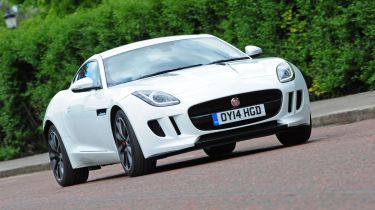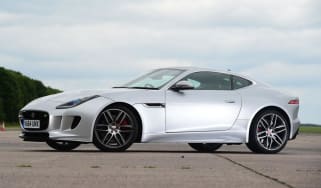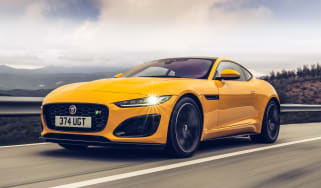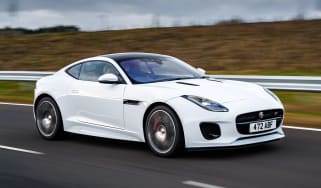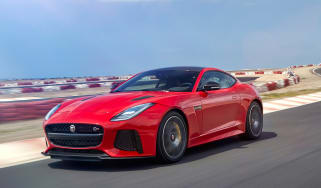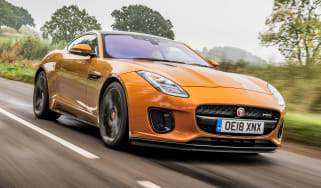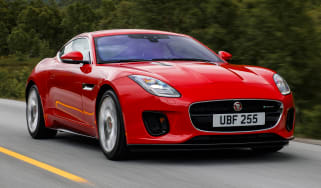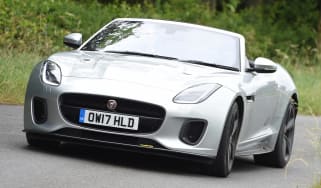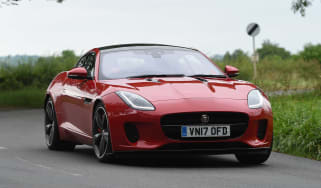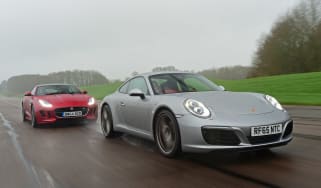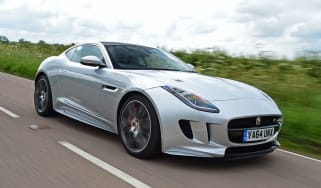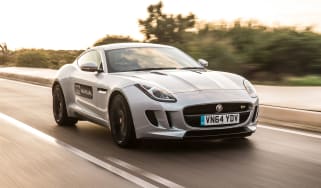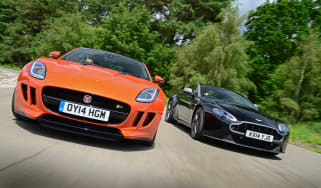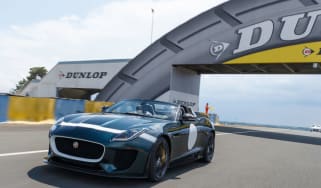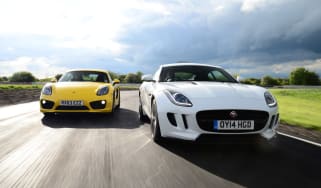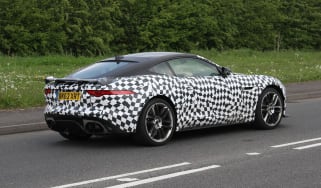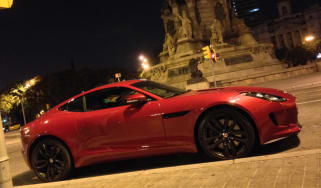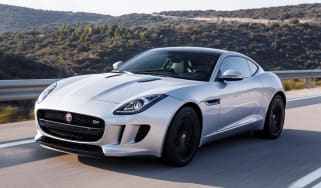Jaguar F-Type Coupe review
The Jaguar F-Type Coupe is dripping with desirability, and gives the Porsche 911 a run for its money

Launched in 2014, a year after the F-Type Convertible, the Jaguar F-Type Coupe harks back to the glory days of the iconic E-Type. It’s stunning to look at, thrilling to own, and is boldly breaking down barriers in a premium sportscar sector where German rival Porsche has been allowed to make hay for far too long.
Until this year, the entry-level F-Type Coupe was the 3.0-litre supercharged S model, but all that changed when Jaguar announced details of the new four-cylinder model. The new engine is a turbocharged 2.0-litre Ingenium unit, producing 296bhp and 400Nm, paired exclusively to an eight-speed Quickshift automatic transmission.
• 2017 Jaguar F-Type Coupe 4-cyl review
Jaguar claims it’s the most powerful four-cylinder production car it has ever produced, capable of sprinting to 60mph in just 5.4 seconds, before reaching a top speed of 155mph. Crucially, it is 16% more efficient than the 335bhp V6 model, with CO2 emissions of just 163g/km.
To coincide with the launch of the four-cylinder model, Jaguar has updated the 2018 model year F-Type. Redesigned front and rear bumpers and optional full LED headlights are the visual clues to the newer version, while a single tailpipe distinguishes the four-cylinder F-Type from the full-fat models.
Used - available now

2023 Hyundai
Bayon
31,716 milesAutomaticPetrol1.0L
Cash £13,100
2022 Renault
Zoe
22,382 milesAutomaticElectric
Cash £11,100
2023 Hyundai
Tucson
41,026 milesAutomaticPetrol1.6L
Cash £20,700
2022 Renault
Zoe
17,836 milesAutomaticElectric
Cash £10,000The unnamed entry-level F-Type Coupe is available with the new four-cylinder engine and the 335bhp version of the V6 engine. Next up is the R-Dynamic, which is available with the same engines plus the addition of the higher-powered 375bp 3.0-litre V6.
The F-Type 400 Sport, announced in January 2017, is powered by a 395bhp version of the 3.0-litre V6 engine and available for one year only. Upgrades include a performance braking system, configurable dynamics and 20-inch wheels finished in a unique dark satin grey finish.
Next up is the roaring F-Type R, complete with a 5.0-litre V8 supercharged engine delivering 543bhp and 680Nm of torque. This sits below the mighty F-Type Coupe SVR, a re-engineered range-topper from Jaguar’s Special Vehicle Operations unit that ups the ante for both power and performance. If a 568bhp, 200mph F-Type is your thing, you can find out more about it here.
You can choose your F-Type Coupe with two- or four-wheel-drive, but a manual gearbox is only available with the six-cylinder engine.
It doesn’t really matter which F-Type you choose though, as all of them deliver performance and thrills worthy of a top-notch competitor to the Porsche 911 and Cayman models, as well as the Aston Martin V8 Vantage.
Engines, performance and drive
What immediately grabs your attention in the F-Type Coupe is its engine. Whether it’s the 3.0-litre V6 or 5.0-litre V8, these supercharged motors have been honed to deliver tractable power and a stunning soundtrack. Even the 335bhp V6 model fires up with a bark, while every press of the throttle comes with an aggressive snarl.
We’ve yet to drive the new entry-level 2.0-litre four-cylinder, but it’s worth noting that it is fractionally quicker to 60mph than the basic V6 model. This is thanks partly to the fact that the four-cylinder F-Type is 52kg lighter than the V6.
• Jaguar F-Type R Coupe review
You will, of course, be worried about the soundtrack. Jaguar claims that the intake and exhaust have been “meticulously tuned” to deliver a symphony pleasing to your ears. We’ll reserve judgement until we’ve experienced the car for ourselves.
Although the company has made some seriously powerful machines in the past, their underperforming transmissions have usually taken the edge off the driving experience. That’s all changed with the F-Type. The eight-speed auto in the V8 R is an incredible gearbox that fully showcases the ability of the engine. It’s silky smooth in full auto mode, and works exceptionally well in semi-automatic mode, too, delivering fast and crisp changes. Unlike some semi-autos, where the manual shift is little more than a gimmick, the F-Type’s gearbox combines the control, accuracy and punch of a double-clutch transmission with the smoothness of a traditional self-shifter.
Unless you really want a manual shift, we’d stick with the auto – the manual isn’t as slick as some rivals’ change, and it’s only available on the V6 anyway. There's also a performance brake system, which adds bigger discs and uprated hydraulics.
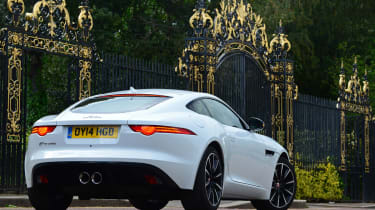
In corners, the car is a lively performer, although the comfortable suspension means it's not quite as sharp as a Porsche Cayman in the corners. Turn off the traction control, and the F-Type will light up the rear tyres at will, and skilled drivers will be able to perform smoky powerslides with ease, although the lack of a limited-slip diff means the Jag can become ragged at the limit.
However, we’re big fans of the all-wheel drive cars – they’ll flatter most drivers with their ability to get all of that power onto the road without drama, while the electric power steering isn’t corrupted in any way – it’s still faithfully responsive. Torque Vectoring by braking is now standard across the range, further improving sharp turn-in into corners and helping to reduce understeer.
With selectable driving modes, the F-Type is a great long-distance GT car, munching miles with ease in the Normal setting. The ride is composed, but there’s still a firm edge and mid-corner bumps do upset the car’s rear end. Flick the switch and slot the R into Dynamic mode and it’s even more noticeable, as the Jag stiffens up and turns hardcore. The steering is light and very responsive, and combined with torque vectoring by braking an inside wheel, it means the F-Type’s chiseled jaw darts into turns quickly. Yet as there isn’t much feedback from the wheel to sense what’s going on, if you’re too ambitious with your corner speed the car will wash wide.
It’s best to go slow in and fast out – but be careful how hard you push the accelerator pedal, because the F-Type AWD is still a supercar at heart. You can adjust your cornering line with the throttle, yet when the tail starts to slide, the electronically controlled active four-wheel-drive system redirects power to the front axle, which makes the Jaguar’s nose snap back into line.
In everyday use, the F-Type is fairly relaxed. While the firm suspension fidgets and shimmies over rough surfaces, it’s pretty comfortable overall, and the long eighth gear means the engine is barely ticking over at motorway speeds.
MPG, CO2 and Running Costs
Fuel economy is unlikely to be a big concern for those lucky enough to afford a Jaguar F-Type. It’s thirsty, expensive to tax and, if used as a company car, will take a big chunk of your salary in Benefit in Kind tax.
Nonetheless, a stop-start system is standard on every model, keeping CO2 emissions down to a relatively reasonable 199g/km on the automatic 335bhp V6 - a figure that's very impressive for such a high-performance sports car. The new four-cylinder F-Type emits just 163g/km of CO2, which equates to a ‘showroom tax’ of £500, some £700 lower than the V6.
Jaguar cars traditionally suffer from heavy depreciation, but experts predict the F-Type will buck this trend, with residual values of over 50 percent after three years. Jaguar has also been performing very well in recent customer satisfaction surveys: it finished sixth in our 2016 Driver Power survey.
Jaguar offers a servicing package over three or five years that is well worth specifying. Opt for the former, and you’ll pay the equivalent of £331 per year (£995 total), while the five-year pack (£1,495) works out at £299 per year.
Interior, design and technology
Jaguar likes to do things differently. While most car makers launch a coupe first and roadster second, Jag has done the opposite.
It’s a clever plan. Roadsters often look a little clumsier than their tin-top siblings, so while the F-Type Convertible is undeniably handsome, the Coupe version is as close to design perfection as you’re likely to get.
Designer Ian Callum claims that the F-Type Coupe is his favourite creation to date, and it’s hard to argue. Like the E-Type, it has a long bonnet and short tail profile that gives it incredible road presence. It’s based on a wider and shorter XK platform, although the F-Type looks and feels a more focused and serious driver’s car than its classically styled stablemate.
Jaguar’s flagship looks as stunning as ever, with crisp lines and gentle curves giving a rakish stance. At the front, the F-Type’s gaping grille dominates the low nose and, with the addition of bonnet vents, helps cool the huge engine. The sleek headlamps follow the bonnet’s contours and feature LED running lights.
The vents and big sill extensions on the side of the car give the F-Type real ground-hugging presence, with the low, tapering roofline flowing into the muscular rear wheelarches and sharply styled back end. Alloys, narrow tail-lights and sloping hatch complete the svelte look, while the diffuser-style rear bumper and quadruple exhausts reinforce the fury on offer from under the bonnet.
The interior design is as precise as the exterior. Open the long coupé door and lower yourself into the F-Type’s cabin and you’re met by lots of soft leather. The high dashboard and chunky centre console put the focus on the driver, and supportive sports seats mean you can get a great driving position.
It’s not all perfect, though – most of the materials feel plush, but the fake carbon fibre around the multimedia system and harder plastic for the trinket tray next to the gear selector detract slightly from the otherwise premium image. These small details feel at odds with the lovely leather and metal used elsewhere.
The V8 R model comes with a more aggressive look courtesy of a Sport Design Pack that’s optional on V6 models. All-wheel drive cars can be recognised by bigger air vents and a more pronounced bonnet bulge.
The latest infotainment system is a big improvement over that in older cars, while Jaguar’s InControl apps give you an alternative navigation method plus podcast and parking apps you can download.
Practicality, comfort and boot space
Despite its many talents, the F-Type isn’t the greatest example of automotive packaging. The cabin is a tight fit – if you’re over six feet tall, you can expect to make some compromises on comfort.
The coupe body creates a 407-litre boot, which is a lot more than you’ll find in the F-Type Convertible, and there’s a deep bin under the boot floor, too. Space drops to 315 litres if you use the load cover, which is more than in the rival Porsche Cayman.
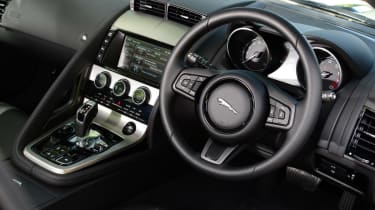
The Jag also has a deep bin at shoulder height between the seats, an armrest cubby and twin cup-holders. It’s comfortable at the wheel, although rear visibility is spoiled by big wheelarches and a small rear window.
Inside, the glove box is a decent size and there’s two cup holders. The door bins are next to useless though.
Reliability and Safety
Jaguar recorded a great result in our Driver Power 2015 satisfaction survey, taking second place overall and cementing its 2014 placing. Yet when it comes to reliability, the brand didn’t fare so well, ranking 13th. The dealers are excellent, though (they rated third out of 31 in our 2015 survey), so if anything goes wrong you can expect good service. Despite packing plenty of tech, we haven’t heard of any horror stories with the Jaguar; it should be stress-free to own.
Euro NCAP doesn’t crash test cars like the F-Type, but the strong, lightweight aluminum structure should hold up well to any impact. The Jaguar only features four airbags – fewer than most of its rivals – but it does have a powerful brake system, while ESP and four-wheel drive add extra peace of mind.
As with luxury items, though, some of the advanced active safety kit on the F-Type is optional: this includes the blind-spot warning system and reversing camera.
